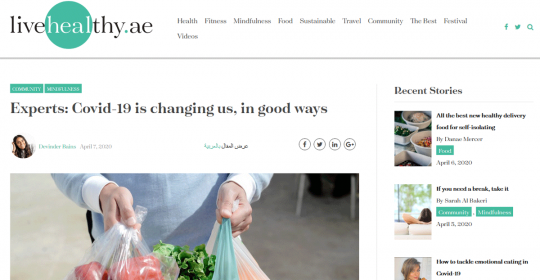
Experts: Covid-19 is changing us, in good ways
Covid-19 has taken over our airwaves, our social media, our conversations and ultimately our lives. Most of the news we receive is bleak and the end of self-isolation seems like a far away land. But could the way we are responding to the Covid-19 threat have any positive impact on us as individuals, as societies and on humanity as a whole? These experts certainly think so…
We’ve stopped taking things for granted
Who else is pining for a walk outside? Having lunch in a cafe or even just going to work?
“Times like these, though worrying and overwhelming, provide clarity for a lot of people, in terms of their life and the way they have been living it,” explains psychologist Fiona Barron. “It allows people to step back and reflect on what really matters, and lets them appreciate how much they miss the simplest of things, such as a hug from a friend, office chatter, going to the gym and wandering around the mall. The phrase: ‘You don’t know what you’ve got till it’s gone’ has never been so true.” Barron, the head of training and development at LEAP leadership courses, believes Covid-19 will change us for the better in the long-term, too.
“People have time to pause and reflect, in order to form new habits that will stay long after we recover from this.”
The vulnerable have become our priority
We’re so busy with our own lives that thinking of others isn’t always a priority, but is Covid-19 changing that?
“Challenging times often provide an opportunity for social bonding and although we can not physically rally together, we are seeing wonderful acts of connection,“ says Barron. “Whether it’s shops changing their opening hours to cater to the elderly or neighbors volunteering to go out and collect essentials for those with underlying health conditions. There is a sense of camaraderie across the globe: societies are ‘staying home’ to protect the ‘at risk’ rather than themselves. We are seeing a shaming of those who are showing selfish, egocentric behavior as individualised societies shift away from a self-serving mindset towards social coherence and a ‘greater good’ mentality.”
Foreign governments are coming together
“The goal of containing and fighting Covid-19 has led to international cooperation and collaboration on various planes, most importantly politically and scientifically,” says Dr Fabian Saarloos, clinical psychologist at the German Neuroscience Center in Dubai. “This includes countries helping each other in the provision of goods, such as Germany receiving face masks from Kenya, or medical summits in which knowledge and expertise and experience are shared, and most notably the movement of medical specialists as well as patients.”
This is something Dr Stephanie Alice Baker, senior lecturer in sociology at City, University of London has also noticed.
“This is the first time in our generation that experts and politicians around the world have been united toward achieving a common goal,” she says. “I think one of the most striking changes is the cooperation of scientists and doctors around the world, because experts in these fields are typically quite competitive.”
We’re looking beyond our differences
Is fighting a common threat making us look past race and religion to become a united force?
“While disasters create fear and can activate our fight, freeze or flight mechanism, challenging times can equally activate a healthy sense of tribe,” explains psychotherapist and author Andrea Anstiss. “It can activate remembrance of our innate humanity and our compassion, which is greater than our differences. We are being pushed to question our entrenched survival patterns of individualism, classism and racism. The Covid-19 challenge is about all of us cooperating.”
Dr Baker agrees: “It is as though people are connecting irrespective of their social identities. They’re coming together as urban communities, as Italians, Londoners, New Yorkers rather than a specific religious or ethnic group.”
Family connections have strengthened
Being forced into isolation has increased our desire to connect with others, especially family.
“We are reminded of what is truly important to us and we want to seek and share the comfort of connection, the joy and peace in caring for our loved ones, the security of belonging,” explains Aamnah Husain, counseling psychologist at the German Neuroscience Center in Dubai. “The heightened emotional response to danger not only makes us become cognisant of our care and concern but also motivates us to express it and act on it. We are spurred to check in on family, ensure their comfort and safety, share information, assistance and hope.” […]
The full and original article was published in livehealthy.ae

